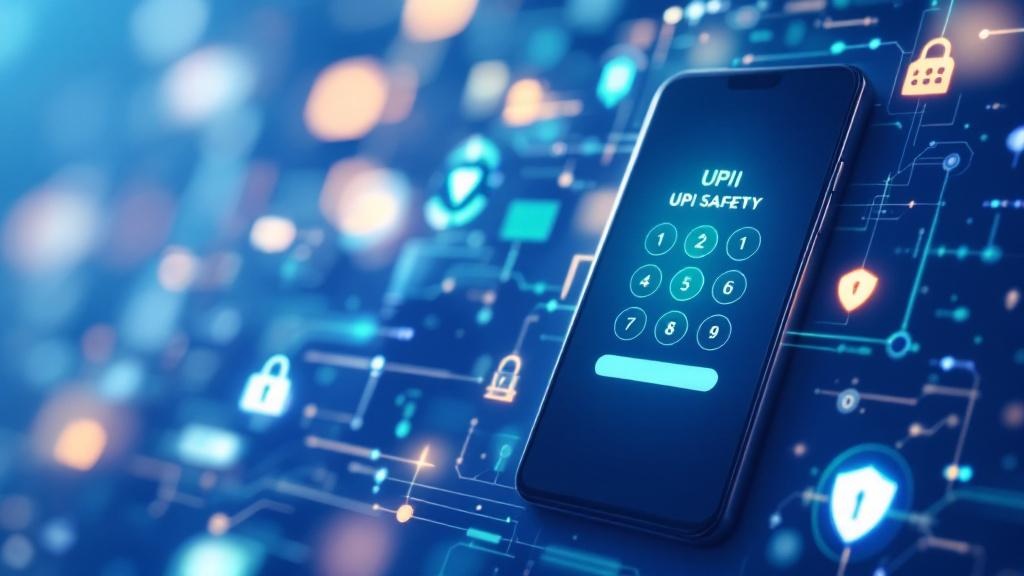The rise of digital payments in India has revolutionized how we handle financial transactions, with UPI (Unified Payments Interface) leading the charge. But with this convenience comes a common question: Is UPI safe? The growth of UPI has been meteoric, yet concerns about cybersecurity and fraud persist. With increasing adoption and more users trusting UPI for payments, ensuring its security is more important than ever. So, is UPI safe for you? Let’s dive into what the Reserve Bank of India (RBI) and other industry experts say about UPI safety and how you can protect yourself while using it.
What is UPI and How Does It Work?
Before diving into safety concerns, let’s briefly understand UPI. Launched by the National Payments Corporation of India (NPCI), UPI is a real-time payment system that enables instant money transfer between bank accounts via mobile devices. It’s become an integral part of the Indian financial ecosystem, used by millions every day through apps like Google Pay, PhonePe, BHIM, Paytm, and others.
To use UPI, all you need is a mobile phone, a UPI-enabled bank account, and a UPI PIN to authorize transactions. The system facilitates everything from peer-to-peer money transfers to bill payments and online shopping purchases, making it incredibly user-friendly.
RBI’s Stand on UPI Safety
The Reserve Bank of India, the primary body overseeing banking regulations and policies, has laid down guidelines to ensure the safety and security of digital transactions. The RBI emphasizes several aspects of UPI security, including encryption, multi-factor authentication (MFA), and user vigilance.
What Makes UPI Secure According to the RBI?
-
Two-Factor Authentication (2FA): Every UPI transaction is authenticated with your UPI PIN, a unique four-digit code that only you should know. This acts as the first layer of protection.
-
Encryption: UPI transactions are encrypted end-to-end, ensuring that your personal and financial details remain confidential. The encryption protocol makes it extremely difficult for unauthorized entities to access transaction data.
-
NPCI Guidelines: The National Payments Corporation of India (NPCI), the body responsible for UPI’s operations, constantly updates its security measures to match global standards. It has established policies like Secure Payment Systems and Secure Digital Signature protocols.
How Secure is UPI? Breaking Down the Key Security Features
UPI PIN Confidentiality
The UPI PIN is crucial for transaction authorization. It’s imperative to never share your UPI PIN with anyone, even in case of a support request. Your UPI PIN is encrypted and stored securely, ensuring that only you have access to it.
Multi-Layer Security
UPI employs several layers of security:
-
Device Authentication: UPI uses your device as an additional layer of security. This means that a transaction can only be authorized if the device is registered with your UPI account.
-
Real-Time Alerts: Every time you initiate or complete a transaction, you receive an instant SMS or notification from your bank, confirming the payment status. This helps in early detection of unauthorized transactions.
-
Risk-Based Authentication: High-risk transactions or large payments often require additional confirmation or a one-time password (OTP) to further enhance security.
Transaction Encryption
UPI transactions are encrypted using the highest industry standards, ensuring that no one can intercept the payment details during the transaction. This makes UPI one of the safest platforms for real-time payments.
Cybersecurity in Mobile Banking
When it comes to UPI security, the RBI works closely with banks to ensure that their apps meet the latest cybersecurity standards. This includes regular audits, updates, and the implementation of encryption technologies to protect against financial cybercrime.
UPI Fraud and Scams: What You Need to Know
Despite the stringent security measures, no system is immune to fraud. UPI frauds have been on the rise, especially with the increasing adoption of digital payment platforms. Let’s take a look at some common types of UPI scams and how you can protect yourself.
Phishing and UPI Scams
Phishing attacks, where fraudsters impersonate legitimate entities (like banks or payment apps), are one of the most common scams targeting UPI users. These fraudsters trick users into revealing their UPI PIN or clicking on malicious links, leading to unauthorized transactions.
How to Protect Yourself:
-
Never share your UPI PIN or sensitive information via email, phone, or text message.
-
Always verify the authenticity of any communication from your bank or payment app.
-
Use only trusted and verified apps for UPI transactions.
Safe Ways to Use UPI
To minimize risks while using UPI, follow these best practices:
-
Use Trusted Apps: Make sure you use well-known UPI-enabled apps like Google Pay, PhonePe, BHIM, Paytm, and others. These platforms employ state-of-the-art encryption and fraud protection mechanisms.
-
Activate Two-Step Authentication: Many apps allow you to enable biometric authentication (like fingerprint or face recognition) for additional security.
-
Avoid Public Wi-Fi: When making UPI transactions, avoid using public Wi-Fi networks. These networks are often unencrypted, making them susceptible to hacking.
-
Set a Strong UPI PIN: Choose a UPI PIN that is not easily guessable. Avoid using easily accessible information like birthdays or phone numbers.
-
Enable Bank App Alerts: Always opt-in for real-time transaction alerts from your bank. This way, you’ll be immediately notified of any unauthorized activity.
Is UPI Safe for Large Transactions?
One common concern is whether UPI is safe for handling large transactions. Given that UPI is primarily used for day-to-day payments, some users wonder about the safety of making large transfers.
The short answer is yes, UPI is safe for large transactions, as long as you follow the proper security protocols. The encryption technology and multi-factor authentication methods are equally applicable to small and large transactions. However, for larger sums, it’s advisable to double-check the transaction details and confirm the recipient’s information.
Is Google Pay UPI Safe? What About Other UPI Apps?
When it comes to UPI apps, the most popular ones in India are Google Pay, PhonePe, Paytm, and BHIM. These apps use similar security measures like encryption, two-factor authentication, and real-time alerts to ensure safe transactions.
Is Google Pay UPI Safe?
Google Pay uses the same UPI infrastructure as other apps but adds additional layers of security, like biometric authentication and fraud detection algorithms, making it highly secure for both small and large transactions.
Is PhonePe Safe for UPI?
PhonePe is another popular UPI-based app with a solid reputation for security. It offers the same features as Google Pay, including two-factor authentication and fraud protection.
Is BHIM UPI Secure?
Being the official app from the government, BHIM UPI comes with the highest level of trust and security. It is designed to comply with RBI regulations, ensuring secure and reliable transactions.
Is Paytm UPI Secure?
Paytm also follows strict security measures, using encryption and OTPs to secure your transactions. It’s as secure as other UPI apps, provided you follow safe usage practices.
UPI Safety Tips You Should Follow
To ensure your UPI experience remains secure, here are a few tips to follow:
-
Never share your UPI PIN with anyone, even if they claim to be from your bank.
-
Be cautious of unsolicited calls and messages asking for payment or personal details.
-
Use only trusted UPI apps and download them from official sources like Google Play Store or Apple App Store.
-
Regularly update your banking apps to benefit from the latest security features and patches.
-
Verify all payment details before confirming a transaction, especially for large amounts.
FAQs: Your UPI Safety Questions Answered
1. Is UPI safe for small transactions?
Yes, UPI is secure for both small and large transactions. The same security measures, including encryption and two-factor authentication, apply.
2. How can I avoid phishing and UPI scams?
To avoid phishing, never share your UPI PIN or sensitive details through email or phone. Verify all communications from your bank or app provider.
3. Is it safe to store my UPI PIN on my phone?
It is not advisable to store your UPI PIN in plain text on your phone. Instead, use a secure password manager or rely on biometric authentication for added protection.
4. Can someone hack my UPI account?
While no system is entirely foolproof, UPI’s encryption and authentication protocols make it extremely difficult for hackers to access your account, especially if you follow recommended safety tips.
5. What should I do if I notice unauthorized UPI transactions?
Immediately report any unauthorized transaction to your bank and raise a complaint with the NPCI. Most banks offer fraud protection and will help resolve the issue.
Conclusion: Is UPI Safe?
In conclusion, yes, UPI is safe, provided you follow the best security practices. With RBI-backed regulations, robust encryption, and multi-factor authentication, UPI offers a high level of protection for digital payments. However, just like with any digital tool, it’s essential to remain vigilant and follow safety tips to prevent fraud and scams. By taking simple precautions, you can enjoy the convenience of UPI without worrying about security issues.
So, whether you’re paying for groceries, transferring money to a friend, or handling business transactions, UPI offers a reliable and secure platform for all your digital payment needs. Stay informed, stay secure, and make the most of the UPI experience!








Comments (0)